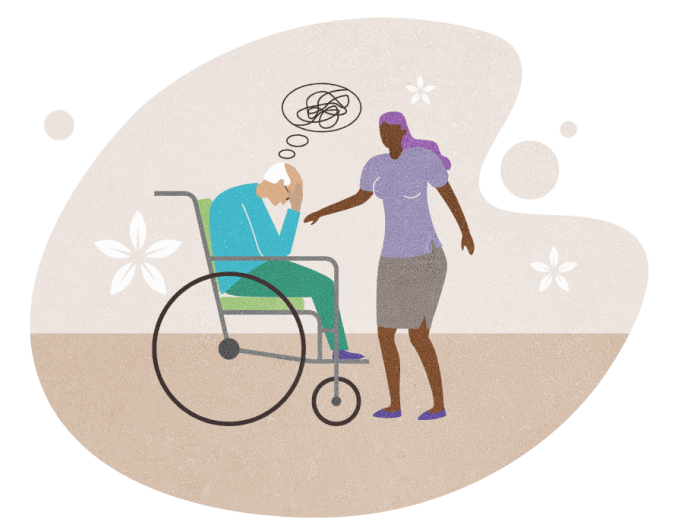Dementia care

Dementia live-in care
Dementia affects millions of people worldwide. It’s a complex condition that presents itself in various ways and progresses over time, affecting many areas of cognition, including memory and behaviour. Care workers have the understanding and experience to make a meaningful difference to the lives of those living with dementia. They can provide the professional support that’s needed to help maintain the dignity and quality of life of people with dementia for as long as possible.
What are the benefits of 24-hour dementia care at home?
Dementia is a progressive condition with symptoms that can require expert support. Receiving this support from a live-in carer will ensure that the client has the best possible quality of life. Key advantages of live-in care include:

Consistency
Receiving personal, one-to-one care and attention ensuring that the client’s needs are fully understood and met. This consistent contact allows new requirements to be spotted and adapted to without disruption.

Comfort
Preserving the client’s cherished routines and familiar home environment are especially important when their cognition is impaired. They can rely on round-the-clock support from a trusted professional.

Cost effectiveness
This approach provides exceptional value for money compared to alternative care options. Thanks to our clear pricing structure, you will have a great understanding of the cost of your care.
Request a free information pack
Call 0208 857 7717 to receive additional information about our services. See why we’re the right team to meet your care needs.
A live-in care worker can help with:
As a care giver, it’s essential to be patient, empathetic, and present in order to create a supportive and trusting environment. Remember, every person with dementia is unique, so keep trying different approaches until you find what works best for your situation.
-
Communication difficulties
One of the most difficult aspects of caring for someone with this dementia is supporting them with communication. The good news is that there are many practical tips and techniques that you can use to help your loved one express themselves and understand you better. For instance:
- Use simple and clear language
- Avoid distractions
- Use visual cues
- Allow enough time for a response
-
Challenging behaviours
It’s essential to remember that the person with dementia is not intentionally being difficult. Often, these behaviours can be caused by frustration, confusion, or even physical discomfort, so it’s crucial to identify the root cause of the behaviour and adjust your approach accordingly. Some effective strategies include:
- Redirecting their attention
- Validating their feelings
- Providing reassurance
- Creating a calm, predictable environment
Specialist dementia care at home
In recent years, there has been a growing interest in how different therapeutic tools can be used to support people living with dementia. By working with a live-in care worker, you have the flexibility to explore these options for your loved one. Designing care packages to meet individual needs is what we do best. We often encourage the following strategies within our packages of care:

Music and art therapy
With a loss of cognitive function comes the risk of isolation and disconnection. Music and art offer a way to reconnect with memories, emotions, and creativity, regardless of our cognitive abilities. Engaging in music and art therapy lets individuals living with dementia find joy, peace, and a sense of purpose.
Pet therapy
Interacting with animals is an excellent way to provide joy and comfort, whilst also having several positive physical and mental impacts. Animals can reduce feelings of loneliness, encourage physical activity and mobility, and create new opportunities for socialising and connecting with others.

Learn more about us
Our stories offer an insight into why we love caring for others. You can also find our answers to the questions that we’ve been asked most often. See the difference we can make to your routine.
Assistive technologies: keeping those with dementia safe at home
Safety at home is the number one priority within care, particularly for those who suffer from dementia. Fortunately, assistive technologies are available to help maintain a safe home environment in the face of memory loss. From GPS tracking devices to wearable alarms and medication reminders, options abound. Consulting with professionals can provide peace of mind and allow people with dementia to continue living at home comfortably and safely.
Planning end-of-life care for people with dementia
Caring for a loved one with dementia can be both emotionally and physically challenging, and planning for end-of-life care adds another layer of complexity to the situation. It is important for families to understand the different options available and to make informed decisions based on their loved one’s needs and wishes. Your care worker will be able to provide the guidance and support needed during this difficult time. By openly discussing end-of-life care with your loved one and care team, we can create a plan that ensures your loved one’s comfort and dignity in their final days.
Speak to our team
A friendly, informal chat is the best way to let us know your requirements. Call 0208 857 7717 and a member of our team will be happy to discuss the dementia care we can offer you or your loved one.
